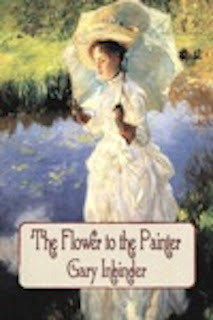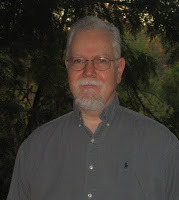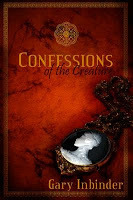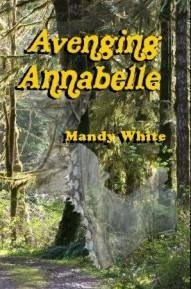Jessica Knauss's Blog, page 63
July 13, 2011
Interview Series: The Flower to the Painter Author Gary Inbinder
 Gary Inbinder's second novel, The Flower to the Painter, has just been released by Fireship Press. It's a story about a young American woman artist in Victorian Europe who disguises herself as a man to advance her career. The author believes it will appeal to readers interested in the art and culture of the period. The novel also deals with themes related to gender identity and sexual sublimation, which adds complexity and interesting nuances to the characters, the narrative and the story-line. Gary is a member of the Bewildering Stories Editorial Review Board, and his short fiction, articles and essays appear in Bewildering Stories, Morpheus Tales, The Absent Willow Review, The Copperfield Review, Humanitas, Touchstone Magazine, Halfway Down the Stairs, and other publications.
Gary Inbinder's second novel, The Flower to the Painter, has just been released by Fireship Press. It's a story about a young American woman artist in Victorian Europe who disguises herself as a man to advance her career. The author believes it will appeal to readers interested in the art and culture of the period. The novel also deals with themes related to gender identity and sexual sublimation, which adds complexity and interesting nuances to the characters, the narrative and the story-line. Gary is a member of the Bewildering Stories Editorial Review Board, and his short fiction, articles and essays appear in Bewildering Stories, Morpheus Tales, The Absent Willow Review, The Copperfield Review, Humanitas, Touchstone Magazine, Halfway Down the Stairs, and other publications. A Chicago West Side native, Gary has worked as a copywriter, a purchasing agent, a retail music store manager, a credit fraud investigator, a paralegal and an insurance lawyer, but these were mere occupations until he could return to his true calling, writing historical fiction.
A Chicago West Side native, Gary has worked as a copywriter, a purchasing agent, a retail music store manager, a credit fraud investigator, a paralegal and an insurance lawyer, but these were mere occupations until he could return to his true calling, writing historical fiction. JK: It sounds as if, like Miguel de Cervantes, you led a full life before writing your first novel.
Gary Inbinder: For about thirty years or so I didn't have much time for writing fiction, although toward the end of my legal career I did manage to have a few non-fiction pieces published.
JK: Both of your novels have been set in the nineteenth century. Do you find it possible to use your life experience in your fiction?
GI: I'm always observing and analyzing, taking incidents from life and weaving them into my fiction. My characters are often based on people I've known, or perhaps they're composites of people. But there are certainly literary influences as well, especially in my historical novels which draw upon the past for inspiration. For atmosphere, I have to rely a good deal on research and imagination, especially when I'm writing about the distant past. As for plots, I believe mine are character driven. I try to create interesting, believable characters, put them in situations where there's a potential for dramatic conflict, and let them work things out.
JK: You sound like a lifelong writer. When did you really get started?
GI: I started writing "seriously" in college, and I did it because I thought I had something to say. Thank God, none of that stuff survives.
JK: What are your reading habits like? Has your reading influenced your novels?
GI: I can't name a favorite, but I do tend to read in streaks. For example, many years ago I went through a Zola phase where I read everything by Emile Zola that I could get my hands on. Then I went through a Japanese phase where I read works by Mishima, Kawabata, Tanizaki and Haruki Murakami to name a few. Recently, I've read several novels and stories by Henry James and Edith Wharton and I believe those stories from the late nineteenth and early twentieth centuries influenced The Flower to the Painter. In particular, I'd mention James's The Aspern Papers, The Portrait of a Lady and The Bostonians and Wharton's The Age of Innocence and The House of Mirth.
JK: I can see those influences in The Flower to the Painter. What was the inspiration for it? I find it especially interesting that you chose to write a first person perspective for a female character.
GI: I believe many creative people feel marginalized, often to the point of alienation. Artists, writers, poets, actors, etc. tend to be "different" and that difference creates empathy with others similarly marginalized. Moreover, alienation can be exacerbated by bias based on gender and sexual orientation. I'm attracted to stories told by outsiders looking in, people who hide behind masks to enter a world that might not otherwise be open to them. I tried to imagine what it would have been like to be a young woman artist in a male dominated culture. I've given some thought to role reversal classics, like Mark Twain's The Prince and the Pauper where the eponymous characters trade places, and If I Were King in which the vagabond poet Francois Villon becomes "King for a Day." There are also "Gender-Benders" like Victor/Victoria, Tootsie and Myra Breckenridge. And I recall social dramas like Gentleman's Agreement, where a journalist posed as a Jew to investigate anti-Semitism in post WWII America, and Black Like Me, where another journalist posed as an African American to experience race prejudice in the segregated south. It's quite a challenge for a man to write convincingly from the female perspective. But I've read two books where it's been done successfully: Arthur Golden's Memoirs of a Geisha and Junichiro Tanizaki's Quicksand. And I'll also mention Alyson Richman's historical novel, The Mask Carver's Son, which she wrote from the perspective of a Gay male Japanese artist of the Meiji era (1867-1912).
JK: How much did you have to research The Flower to the Painter?
GI: I've read a good deal about the Victorian period, both fiction and non-fiction, including art books and biographies of artists. I also took Art and Art History courses in college, and I'm a lifelong museum addict.
JK: So the research was kind of an organic process for you. Was it hard to find the right language for narrator and the characters since they're so far removed in time from the reader?
GI: In The Flower to the Painter I tried to capture the voice of an intelligent, creative, well educated young woman of the Victorian era. I had to rely on the literature of the period, historical fiction, films, further research and imagination to create Marcia Brownlow's "voice."
JK: Your writing is very put-together. It has a certain natural flow that I'm sure takes a lot of organization. How about your work area?
GI: I write in streaks, and my work area's a mess. Not too inspiring, I'm afraid. With the aid of strong coffee, I like to work early in the morning when it's cool (I live in Southern California) and relatively quiet.
JK: Are your family and friends supportive of your writing habit? GI: I have readers who give me valuable feedback, and I'm especially fortunate to have a supportive group of friends on the Bewildering Stories Editorial Review Board.
JK: Thanks so much for stopping by and talking about your enchanting new novel.
GI: Thank you for the interview. I enjoyed it!
Find out about Gary's latest projects here: http://garyinbinder.com/
 Ever wished Frankenstein's monster could have met with a happier fate? Gary's first novel, Confessions of the Creature, imagines in vivid detail how the monster could learn what it means to be human and become an upholder of the society that so violently rejected him at first.
Ever wished Frankenstein's monster could have met with a happier fate? Gary's first novel, Confessions of the Creature, imagines in vivid detail how the monster could learn what it means to be human and become an upholder of the society that so violently rejected him at first.
Published on July 13, 2011 00:25
July 11, 2011
The Flower to the Painter by Gary Inbinder (New Release from Fireship Press)
Gary Inbinder's second novel, The Flower to the Painter, transports the reader into the elegant, commercialistic art world of late nineteenth-century Europe. Through the sharp eye of protagonist Marcia Brownlow, we float along the canals of Venice, travel by train through the Alps, and meet John Singer Sargent, Leighton, Whistler, and other memorable painters of the time. We even exchange sketches with Renoir in Montmartre.
Marcia Brownlow was down on her luck when she came to Europe as a governess, a position that quickly became intolerable. Pleading her case before the wealthy aunt of her best friend, Marcia is faced with a risky but lucrative proposition. She accepts the challenge of working for a famous writer not as Marcia but as her brother, Mark. The combination of Mark's gender advantage and Marcia's artistic talent quickly propels her into a promising career. Her "unnatural" bent toward women allows to her romance her wealthy patronesses with pleasure, but only up to a certain frustrating point. Which will Marcia choose: her love or her art? Does it have to be one or the other?
Inbinder's intuitive sense of the sights, sounds, and smells of the period help the reader to feel that Marcia's conflicted, quixotic adventure is their own. It's not easy for a male author to convince the reader that he's inside the head of a female narrator, but even that metaliterary tension contributes to the success of this delightful novel.
In short, Inbinder's vivid language and memorable characters immerse the reader in the nineteenth-century European art scene. This book is a must-read for any art history fan as well as readers interested in a satisfying, gender-bending romance.
Tune in again on Wednesday for a compact but insightful interview with the author.
Marcia Brownlow was down on her luck when she came to Europe as a governess, a position that quickly became intolerable. Pleading her case before the wealthy aunt of her best friend, Marcia is faced with a risky but lucrative proposition. She accepts the challenge of working for a famous writer not as Marcia but as her brother, Mark. The combination of Mark's gender advantage and Marcia's artistic talent quickly propels her into a promising career. Her "unnatural" bent toward women allows to her romance her wealthy patronesses with pleasure, but only up to a certain frustrating point. Which will Marcia choose: her love or her art? Does it have to be one or the other?
Inbinder's intuitive sense of the sights, sounds, and smells of the period help the reader to feel that Marcia's conflicted, quixotic adventure is their own. It's not easy for a male author to convince the reader that he's inside the head of a female narrator, but even that metaliterary tension contributes to the success of this delightful novel.
In short, Inbinder's vivid language and memorable characters immerse the reader in the nineteenth-century European art scene. This book is a must-read for any art history fan as well as readers interested in a satisfying, gender-bending romance.
Tune in again on Wednesday for a compact but insightful interview with the author.
Published on July 11, 2011 01:04
July 10, 2011
Six Sentence Sunday: Death at the Wedding
Were back to six sentences from the wedding celebrations in tenth-century Burgos in The Seven Noble Knights of Lara. I feel especially vulnerable about this snippet because it's the first death scene in a book that will have many more. It has to be right. I'm kind of liking the oblique way it's portrayed, but that may not be right for the inciting incident of a family revenge saga. What do you think? I'm open to suggestions. I may have to set this scene aside until after I finish the entire first draft, but I appreciate your comments so very much! Thank you.
By the time we get to this scene, we've seen Álvar Sánchez's charming self spend huge amounts of time with his cousin, the bride, doña Lambra, so any affection the reader has for the character should make this all the more heart-rending. After this, we have a lot of reaction and turmoil.
To set it up: there has been a contest of the knights' prowess on the riverbank, after which male egos have raged out of control. (The sentences are long -- I'll break them up after SSS treatment.)
* * *
Gonzalo drove his fist into Álvar's face so hard that he collapsed at the feet of his horse, which reared noisily, bringing its sharp hooves down on its rider's flesh again and again until Muño Salido seized the reins and led it, still kicking, away. Álvar's teeth bounced and rolled on the soft earth or landed on people's pointed shoes like fallen pebbles. Shining blood sprouted from under his body and raced outward, covering the ground with a steaming red plague. Doña Lambra let out a scream much louder than any of the lance blows had been on the scaffold as Justa dropped to her knees and took Álvar's bloodied head in her hands. The little page stooped and touched Álvar's limp hands and still chest. They looked up at doña Lambra and shook their heads.
* * *
I've had a suggestion for hearing his skull crack, but I'm feeling squeamish about that possibility. If a guy was trampled by a horse and we saw his teeth fall out and blood everywhere, I would assume the worst without listening for the crunch of bones, but maybe that's just me.
Thanks again for stopping by my blog! Check out the other snippets here.
Tomorrow and Wednesday: Gary Inbinder's The Flower to the Painter.
By the time we get to this scene, we've seen Álvar Sánchez's charming self spend huge amounts of time with his cousin, the bride, doña Lambra, so any affection the reader has for the character should make this all the more heart-rending. After this, we have a lot of reaction and turmoil.
To set it up: there has been a contest of the knights' prowess on the riverbank, after which male egos have raged out of control. (The sentences are long -- I'll break them up after SSS treatment.)
* * *
Gonzalo drove his fist into Álvar's face so hard that he collapsed at the feet of his horse, which reared noisily, bringing its sharp hooves down on its rider's flesh again and again until Muño Salido seized the reins and led it, still kicking, away. Álvar's teeth bounced and rolled on the soft earth or landed on people's pointed shoes like fallen pebbles. Shining blood sprouted from under his body and raced outward, covering the ground with a steaming red plague. Doña Lambra let out a scream much louder than any of the lance blows had been on the scaffold as Justa dropped to her knees and took Álvar's bloodied head in her hands. The little page stooped and touched Álvar's limp hands and still chest. They looked up at doña Lambra and shook their heads.
* * *
I've had a suggestion for hearing his skull crack, but I'm feeling squeamish about that possibility. If a guy was trampled by a horse and we saw his teeth fall out and blood everywhere, I would assume the worst without listening for the crunch of bones, but maybe that's just me.
Thanks again for stopping by my blog! Check out the other snippets here.
Tomorrow and Wednesday: Gary Inbinder's The Flower to the Painter.
Published on July 10, 2011 00:46
July 8, 2011
Weather Updates
July third, at about 10 pm, my husband and I got to watch a monsoon burst together. We were joined by an Arizona native:
 He was objectively three inches long.
He was objectively three inches long.
On the fourth, my husband had to go to work for a few hours in the afternoon, so I had to watch this one by myself. It's hard to hear over such pattering, but there's thunder throughout this video.
Feeling soaked yet? We aren't. Even with bursts like this, which last about 30 minutes, the ground is mostly dry in three hours. Astounding place, this Arizona. We've been lucky because we haven't suffered from power outages resulting from falling trees, and we're nowhere near a place where landslides would be a problem. My husband had to take a different route home, because his usual road goes right through a "wash," basically a channel like a dry riverbed kept clear to collect all this water and send it out to sea, carrying silt, trees, and unlucky travelers with it. My main thought is: Hooray for Mother Nature, for making this place unique.

 He was objectively three inches long.
He was objectively three inches long.On the fourth, my husband had to go to work for a few hours in the afternoon, so I had to watch this one by myself. It's hard to hear over such pattering, but there's thunder throughout this video.
Feeling soaked yet? We aren't. Even with bursts like this, which last about 30 minutes, the ground is mostly dry in three hours. Astounding place, this Arizona. We've been lucky because we haven't suffered from power outages resulting from falling trees, and we're nowhere near a place where landslides would be a problem. My husband had to take a different route home, because his usual road goes right through a "wash," basically a channel like a dry riverbed kept clear to collect all this water and send it out to sea, carrying silt, trees, and unlucky travelers with it. My main thought is: Hooray for Mother Nature, for making this place unique.
Published on July 08, 2011 00:45
July 6, 2011
Best Kept Secret by Amy Hatvany
I normally shy away from "issue" novels, but Amy Hatvany's compelling language and accurate characterization, so firmly rooted in the real life of thousands of people, drew me along with such a firm grasp that I couldn't put it down. Through the magic of her honest writing style, the reader comes to genuinely like the main character, Cadence, as she tries and fails to cope with tremendous pressures. We sympathize with her when she slowly realizes that she alone cannot maintain a writing career to earn money and raise her son the way she wants to without help. But she feels utterly alone, in spite of the support of her beloved sister and the moms in the various groups she takes her to, who seem enviably "together," with no problems they can't handle. As she indulges too much in the relief of alcohol, her inevitable downward slide is just as surprising to the reader as it is to Cadence. Even as she researches the symptoms of alcohol addiction on the internet, she reaches rock bottom and loses it all when her ex husband takes their boy and sues for custody.
Although most of the readers of this book will be "normies," who don't drink too much, Hatvany's vivid exploration of Cadence's thought processes and the revulsion she feels even as as purchases and pours the wine and vodka forces us to see how her predicament is a possibility for so many everyday people who can't ask for help for whatever reason. This novel will help anyone with any kind of addiction to feel less alone, and anyone who knows an addict to learn what they can do to help.
In short: beautifully written, realistic, by a sensitive writer, and highly recommended.
Although most of the readers of this book will be "normies," who don't drink too much, Hatvany's vivid exploration of Cadence's thought processes and the revulsion she feels even as as purchases and pours the wine and vodka forces us to see how her predicament is a possibility for so many everyday people who can't ask for help for whatever reason. This novel will help anyone with any kind of addiction to feel less alone, and anyone who knows an addict to learn what they can do to help.
In short: beautifully written, realistic, by a sensitive writer, and highly recommended.
Published on July 06, 2011 01:35
July 4, 2011
Happy Fourth of July!
Published on July 04, 2011 01:14
July 3, 2011
Six Sentence Sunday More, More, More, Sail To Italy!
Thank you for all the wonderful comments last week! You're fabulous!
Check out the other six sentence excerpts here.
And happy July 4th! In Arizona, we're not supposed to set off fireworks, and I hope people obey the law, since half the state is on fire already.
I'm celebrating the fact that Sail To Italy and Sail From Italy are independent from the digital format and can be purchased in a gorgeous paperback. ;)
In this scene from Sail To Italy, Princess Noreena has set the terrifying Pirate Pierre the unexpectedly difficult task of tracking down her long-lost second cousin, who probably lives in Corsica. Witness the struggle and its silly resolution! (Only five sentences unless I've counted wrong.)
* * *
Pierre was going mad. He resorted to the very last hope. "Pardon me, ma'am, but do you know an Antonio Carlucci?" Pierre asked without much hope in the town square."Why, yes. I'm meeting him here, today, now. What do you want of him?" said the nice lady.
* * *Next week: more from The Seven Noble Knights of Lara! ¡Olé!
Check out the other six sentence excerpts here.
And happy July 4th! In Arizona, we're not supposed to set off fireworks, and I hope people obey the law, since half the state is on fire already.
I'm celebrating the fact that Sail To Italy and Sail From Italy are independent from the digital format and can be purchased in a gorgeous paperback. ;)
In this scene from Sail To Italy, Princess Noreena has set the terrifying Pirate Pierre the unexpectedly difficult task of tracking down her long-lost second cousin, who probably lives in Corsica. Witness the struggle and its silly resolution! (Only five sentences unless I've counted wrong.)
* * *
Pierre was going mad. He resorted to the very last hope. "Pardon me, ma'am, but do you know an Antonio Carlucci?" Pierre asked without much hope in the town square."Why, yes. I'm meeting him here, today, now. What do you want of him?" said the nice lady.
* * *Next week: more from The Seven Noble Knights of Lara! ¡Olé!
Published on July 03, 2011 01:04
July 1, 2011
Memoirs for Monsoon in Arizona
My most vivid memory of Arizona before my husband and I came to live here was a few seconds during one of my family's road trips. We were between the car and the restaurant and in the distance, over the mountains, beyond the palo verdes and creosote, a black cloud rumbled with sudden flashes of white electricity. At the time, I knew with the firmness only a child can feel that California was the only place to be. The dry electricity falling out of the sky to zap innocent girls was much more sinister to me than the natural, expected occasional realignments of the Earth that were earthquakes.
So we've come to the "monsoon season" in southern Arizona. That dry lightning I'd met so many years before rumbled throughout the valley and over the mountains. Wednesday, I watched with wide eyes as water came from the sky. A drop would evaporate off the sizzling pavement before another could come to replace it, and it wasn't that the rain was slow. In my experience, water only evaporates that quickly when it's boiling. It was astonishing to see outside of the kitchen! That night at 4 a.m., the loudest thunderclap I think I've ever heard failed to wake up my tired husband. I went to the glass doors to watch the downpour in the strobe-like light. This time, the parking lot was able to hold on to the precious fallen drops and after 81 days without rain, it looked like a swimming pool to me. I couldn't resist opening to door to test the air. It was like inserting my arm into a long sleeve made of mud and soaking concrete odors. The air surged so strongly into the apartment that my computer came out of sleep mode. Ah! Rainfall! Life! It was enough to make me cry, if I'd had enough water stored up. Thursday morning my husband commented that he should have left the car out in the open, to give it a wash, but there was no trace of the deluge only hours before.
I object to the use of the term "monsoon," which I became familiar with in the context of the truly incessant deluges that happen yearly in Bangladesh and Southeast Asia. Nothing that evaporates in the breaking dawn should really be compared to what happens there, even when there are mudslides and the washes fill up and drag debris and silly people's cars away to the sea. "Rainy season" would be more accurate than "monsoon," and perhaps we could go as far as "moister than usual season," for what's happening now, or the desert climatologists could advocate better for whatever technical term they've developed.
Because the Sonoran Desert at its wettest -- I'm guessing -- won't even approach a typical day in coastal Oregon (the location of my biggest fans). (If you're a fan, tell me where you're located!)
So we've come to the "monsoon season" in southern Arizona. That dry lightning I'd met so many years before rumbled throughout the valley and over the mountains. Wednesday, I watched with wide eyes as water came from the sky. A drop would evaporate off the sizzling pavement before another could come to replace it, and it wasn't that the rain was slow. In my experience, water only evaporates that quickly when it's boiling. It was astonishing to see outside of the kitchen! That night at 4 a.m., the loudest thunderclap I think I've ever heard failed to wake up my tired husband. I went to the glass doors to watch the downpour in the strobe-like light. This time, the parking lot was able to hold on to the precious fallen drops and after 81 days without rain, it looked like a swimming pool to me. I couldn't resist opening to door to test the air. It was like inserting my arm into a long sleeve made of mud and soaking concrete odors. The air surged so strongly into the apartment that my computer came out of sleep mode. Ah! Rainfall! Life! It was enough to make me cry, if I'd had enough water stored up. Thursday morning my husband commented that he should have left the car out in the open, to give it a wash, but there was no trace of the deluge only hours before.
I object to the use of the term "monsoon," which I became familiar with in the context of the truly incessant deluges that happen yearly in Bangladesh and Southeast Asia. Nothing that evaporates in the breaking dawn should really be compared to what happens there, even when there are mudslides and the washes fill up and drag debris and silly people's cars away to the sea. "Rainy season" would be more accurate than "monsoon," and perhaps we could go as far as "moister than usual season," for what's happening now, or the desert climatologists could advocate better for whatever technical term they've developed.
Because the Sonoran Desert at its wettest -- I'm guessing -- won't even approach a typical day in coastal Oregon (the location of my biggest fans). (If you're a fan, tell me where you're located!)
Published on July 01, 2011 01:31
June 29, 2011
Interview: Indy Thriller Author Mandy White
 Today Famous Writer has managed to get busy-as-a-bee Mandy White to sit down long enough to talk about her writing, which is sure to make her the Stephen King of the Pacific Northwest.
Today Famous Writer has managed to get busy-as-a-bee Mandy White to sit down long enough to talk about her writing, which is sure to make her the Stephen King of the Pacific Northwest. JK: Have you been writing for a long time?
Mandy White: I've loved writing and storytelling ever since I was old enough to write. As a child, I used to make up "bedtime stories" in my head as I lay in bed at night. I created an ongoing series complete with carefully developed characters, about a pair of sisters who owned a farm that had every type of animal imaginable and of course, hundreds of horses of every breed. I often wonder if I could turn that sort of thing into a Young Adult series and turn the farm into an animal rescue facility. Maybe one day I will.
When I turned 40, I realized that writing was the only thing I'd ever truly wanted to do and decided to get on with the business of pursuing my dream. I now write full time, writing books and doing freelance article writing for extra money. To date, I have three published books: The Jealousy Game, The Immigrant and Avenging Annabelle. I write poetry as well, and have considered compiling my work into a book sometime in the future. I have several more projects in progress, and I intend to release them at a rate of one full-length novel per year.
 JK: Ambitious! Tell us more about your latest.
JK: Ambitious! Tell us more about your latest.MW: My latest novel, Avenging Annabelle, is a thriller set in the area where I currently live. It's about a logger who takes the law into his own hands after his daughter is abducted and he is unable to go to the police to tell them what he knows. It may sound like a typical tale of revenge, but one of the things that makes this story unique is the setting. It transports readers to Vancouver Island, giving them a first-hand look at the breathtaking beauty of the area and allowing them to experience what small town life is like in this part of the world. It also gives the reader a brief glimpse of the Canadian logging industry from an insider's point of view.
I'm expecting Avenging Annabelle to appeal to a wide variety of readers. It has a little bit of everything. There's a supernatural aspect to the story that should spark the interest of my fellow King and Koontz fans, as well as plenty of suspense, sprinkled a bit of romance and violence.
JK: Do you have a favorite word? How do you use language to differentiate your characters and/or settings?
MW: A person reading Avenging Annabelle is likely to think that my favorite word is the F word, and perhaps that isn't far from the truth because I have a tendency to use it a lot. The language a character uses is extremely important in the development of that character. In Avenging Annabelle, much of the dialogue is filled with profanity, which I felt was necessary in order to make these characters believable. In this particular story, some of the characters are loggers, who are known for their colorful language, and the villain is a psychotic drug addict so once again, the use of foul language is appropriate. Foul or not, the type of language a writer chooses to use is an integral part of any story.
JK: What is your favorite book? How does what you read influence your work?
MW: I have so many favorite books that it's impossible to pick just one. One series I particularly enjoyed was the Droughtlanders trilogy by Canadian author Carrie Mac. If you like tales of post-apocalyptic fantasy with plenty of action, this series is a must-read!
As I mentioned, I'm a long-time fan of both Stephen King and Dean Koontz, and I think a lot of my work is fashioned after that sort of thing. When I'm creating a scenario in a story, I often find myself thinking, "WWKD?" ("What would King do?") I contemplate whether or not he would use a particular type of language or scenario. Essentially, it is his work that gives me the guts to go ahead and say it, spray it, or use whatever graphic imagery it takes to say what I want to say. I was a 'shy' writer for many years, and in my opinion, it made my work dull and unimaginative – a perfectly acceptable style for writing articles, but lousy for fiction. When you look at Stephen King's work, you see that he isn't afraid to go there, no matter where it is that needs to be gone to tell a story, and that's what has inspired me to "come out of my shell" and just write without worrying about who I'll offend. My favorite Dean Koontz characters that I'd like to see more of are Odd Thomas (Odd Thomas series) and Christopher Snow (Fear Nothing and Seize the Night).
JK: That is certainly some solid writing to allow to influence your style. Where does the actual breath of inspiration come from for you?
MW: I get inspiration from so many different things. All of my best story ideas have come from dreams. My second book, The Immigrant, is based on a bizarre dream I had many years ago, in which a creepy Richard Simmons lookalike creates a genetic abomination. I have another dream-based story currently in the early stages of development; a fantasy tale involving time travel.
Avenging Annabelle started from a scene I saw in a dream, in which a man was digging up a child's coffin while the child's ghost sat and watched him. That scene is now Chapter 1 of the novel. I remember writing the scene down, thinking I might be able to work it into a short story. Somehow, a full length novel grew from it. At some point in the early development of the story, when I was contemplating the issue of where it should take place, it occurred to me that it could take place right here, in the very neighborhood where I once lived.
JK: So geography definitely influences your creative process. What else from real life creeps into your fiction?
MW: My life experiences have provided me with a seemingly bottomless well of material to write about, and my rather twisted imagination has been known to take me in some unexpected directions. Most of my characters are based on people I have met, or a combination of characteristics from several different people. This is true of both the heroes and villains I create. Avenging Annabelle was very directly influenced by my immediate surroundings, and I found it easy to craft such a tale simply by drawing on what I knew. People from afar are so often amazed when I describe this place where I live that I thought it would make a wonderful setting for a story. There are several details in the story that are taken from my real life; for example, the characters Jim and Trish referring to baby deer as 'transformers' because of the way they fold up when they sense danger. Then there's the bumper sticker that reads, "Hug a Logger – You'll Never go Back to Trees", or Trish nicknaming her faulty mini-van the "Anti-Chrysler." I had a Dodge mini-van once that was the biggest lemon I've ever owned, and I named it the Anti-Chrysler.
JK: How much time a day do you devote to fiction writing? What is your work area like? Do you have any methods that might seem unusual or inspiring to other writers?
MW: When working on a book or any project that's really coming together, I try to spend several hours a day working on it. I sometimes put the comedy network or a funny movie on for background noise while I work. It may seem odd that my latest book covers a rather dark topic, yet I wrote most of it while listening to comedy. I'm a die-hard comedy addict, and it's reflected in some of my work, such as The Immigrant, which can only be described as a sci-fi comedy novella.
I find comedy inspiring because it makes me laugh. Laughter makes me feel joy, and that joyous feeling creates a tidal wave of creative energy. To be at my most productive, I've found that I do best when I get into the happiest state of mind possible. Sometimes it takes comedy to get into that state of mind, and sometimes I can do it by listening to a favorite song, such as "I Love Myself Today" by Bif Naked or my latest favorite, "Born This Way" by Lady Gaga. When the weather's nice, my favorite spot to sit and write is in my back yard. I have a wooden two-seat swing that sits next to a pond. The spot is surrounded by a huge grape arbor, and during the summer the grapevines cascade down to the ground, creating an amazing curtain of green leaves. It's one of the best places in the world to be, and I do a lot of writing there, either listening to the gurgle of the pond or wearing headphones and listening to music.
JK: Ah. Color me massively jealous. The entire state of Arizona is on fire and there's not a gurgling pond to be had. You describe Avenging Annabelle as your third book. Can you tell us a little more about your first two?
MW: My second book, The Immigrant, is reflective of one of my earlier efforts, written back in the early 1990s. I liked the story idea, but it was lacking in many ways so I just filed it away. I intended to one day include it in a collection of short stories, once I had written more stories to fill said collection. I resurrected the story and rewrote it last year, when I was looking for something a little more light-hearted to follow my first book, The Jealousy Game.
The Jealousy Game is a sort of self-help guide to bad relationships that demonstrates how seemingly innocent displays of jealousy in the beginning can be a warning of worse things to come. It's based on a combination of my own personal experiences and those of many other women I've known, including my own daughter. I was inspired to write it when I saw her in a relationship that very closely mirrored one I'd had in the past and I was terrified that she might follow in my footsteps.
After writing The Jealousy Game, I was worried about being pigeonholed early in my career as some kind of angry man-hating feminazi writer when fiction writing is where I actually want to be. I redeveloped The Immigrant, extending it into a novella that could be published as a stand-alone story. I wanted to have another example of my writing out there besides The Jealousy Game, a book I personally wasn't very fond of. The depressing subject matter of that book evokes far too many unpleasant memories for me. The crazy thing is, The Jealousy Game has outsold The Immigrant by twice as much and it has gotten amazing reviews so far.
JK: I'm sure a lot of readers have found something to identify with in The Jealousy Game, and I know that, as I reader, I look for a book to speak to me directly somehow before I buy it. Do you get feedback aside from sales figures? Are your family and friends supportive?
MW: So far, my first two books have gotten some great reviews, which I find promising, considering that my career as an author is still essentially in its infancy. I'm still working on developing a definable fan base, but I'm hoping that Avenging Annabelle will take me over that threshold and help me gain a solid foothold as a writer of fiction.
I have some close friends and family who are very supportive, even though not all of them necessarily read my work. There are some others who act a bit uncomfortable when the topic of my writing is raised, and I'm guessing it could be one of two possible reasons: A: They aren't terribly interested in reading my work and are worried about being put on the spot and expected to read something they don't want to, or B: They don't want to read my work because they're afraid it might be absolutely dreadful and they'll be forced to either lie to me or hurt my feelings by telling me the awful truth.
JK: Those sound like typical family reactions: filled with unfounded fears! It's okay because statistically most readers in the world aren't related to you.
MW: I've gotten amazing support from afar, from fellow writers (and readers) I've met online and also from old childhood friends and acquaintances I haven't seen since we went to school together.I know how cruel critics can be, and I'm as prepared as I can be for the inevitable slamming of my work. I know that not everybody will like what I write, and that's perfectly understandable. There has yet to be a book written that appeals to each and every person who reads it, which is why there are billions and billions of books out there. As long as my work appeals to the people who enjoy that particular sort of thing, then I am building a fan base and consider the work to be a success.
JK: That's a healthy attitude, since writing is a long haul. Finally, the most important question: Where can interested readers find your work?
MW: At present, Avenging Annabelle is only available from here, but it should be on Amazon, Barnes & Noble and other major booksellers by late July to early August of 2011.
I don't have a blog at this time, but readers can find information about my upcoming projects on my Facebook fan page.
JK: Thank you so much for taking time out of your busy schedule to be with us here.
MW: Thanks Jessica!
Also find out about all Mandy's work at her Amazon author page.
Published on June 29, 2011 00:45
June 27, 2011
It's So Obvious We Don't Even Realize It Until Someone Points It Out

About 98% of the thoughts that go through our minds are repetitive and useless.
Yep. It's a side effect of the way human consciousness has developed.
Take a moment now to witness the thoughts that cross your mind. Just by observing them and letting them go on their merry way, a lot of people can decrease these repetitive thoughts. Enjoy the silence!
Published on June 27, 2011 01:26





